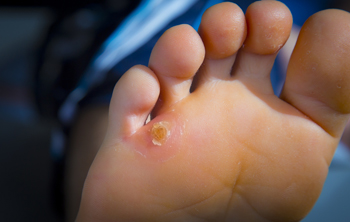 A small area of skin on the foot that has become thickened due to excess friction may be referred to as a corn. Wearing shoes that do not fit properly may cause corns to form, as well as other foot conditions like bunions or hammertoes. Research has shown there are three kinds of corns that can develop. A seed corn typically forms on the soles of the feet and often appear in groups. These types of corns can also be linked to dry skin. A soft corn is found between the toes and stays moist from wearing socks and shoes all day. Hard corns are generally the most common and are located on wider portions of thickened skin on the foot. Most corns become quite painful as they thicken and may appear infected. Relief may be found when appropriate shoes are worn, and a protective covering is placed over the corn as a layer of protection. Corns can disrupt one’s daily activities so it is strongly suggested that a consultation be scheduled with a podiatrist who can suggest effective treatment methods.
A small area of skin on the foot that has become thickened due to excess friction may be referred to as a corn. Wearing shoes that do not fit properly may cause corns to form, as well as other foot conditions like bunions or hammertoes. Research has shown there are three kinds of corns that can develop. A seed corn typically forms on the soles of the feet and often appear in groups. These types of corns can also be linked to dry skin. A soft corn is found between the toes and stays moist from wearing socks and shoes all day. Hard corns are generally the most common and are located on wider portions of thickened skin on the foot. Most corns become quite painful as they thicken and may appear infected. Relief may be found when appropriate shoes are worn, and a protective covering is placed over the corn as a layer of protection. Corns can disrupt one’s daily activities so it is strongly suggested that a consultation be scheduled with a podiatrist who can suggest effective treatment methods.
If you have any concerns regarding your feet and ankles, contact one of our podiatrists of Toe-tal Family Footcare Associates. Our doctors will treat your foot and ankle needs.
Corns: What Are They? and How Do You Get Rid of Them?
Corns can be described as areas of the skin that have thickened to the point of becoming painful or irritating. They are often layers and layers of the skin that have become dry and rough, and are normally smaller than calluses.
Ways to Prevent Corns
There are many ways to get rid of painful corns such as wearing:
- Well-fitting socks
- Comfortable shoes that are not tight around your foot
- Shoes that offer support
Treating Corns
Treatment of corns involves removing the dead skin that has built up in the specific area of the foot. Consult with Our doctors to determine the best treatment option for your case of corns.
If you have any questions please feel free to contact our office located in Vista, CA and Las Vegas, NV . We offer the newest diagnostic and treatment technologies for all your foot and ankle needs.